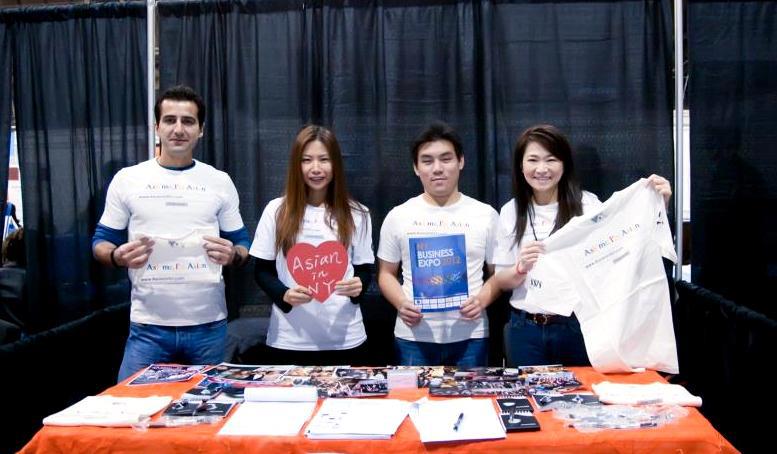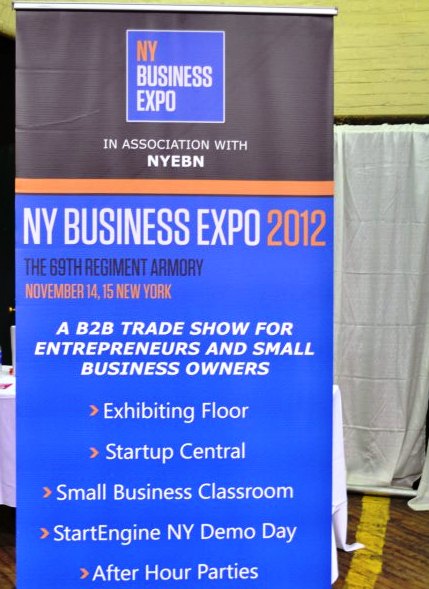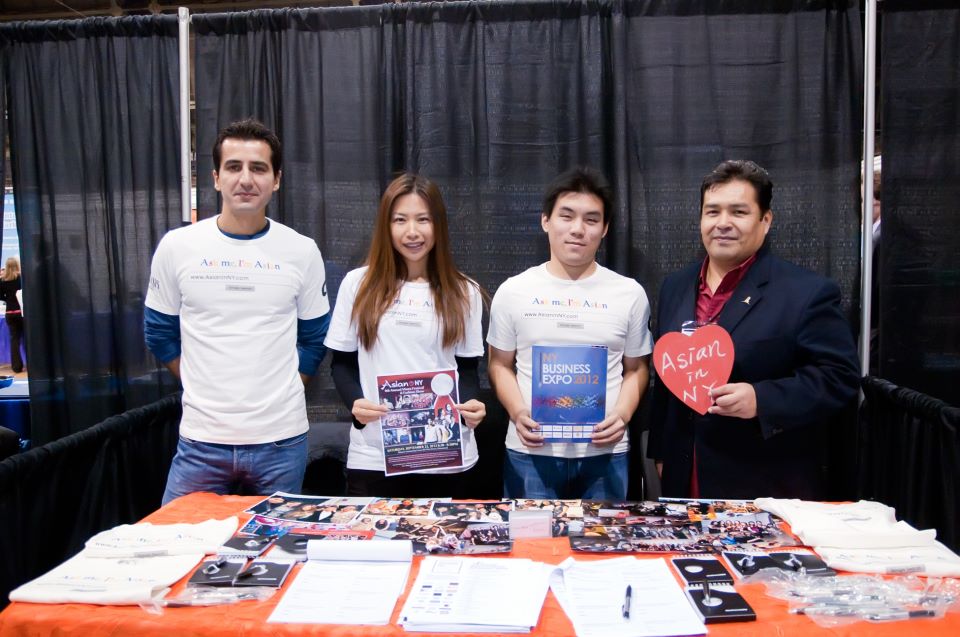By Seaver Wong
On Nov 14th, I had the experience of going to my first Business Expo. It didn’t disappoint, it was actually a very good experience and we got a lot of sign-ups to join AsianInNY.com as members. As a vendor, I got to interact with some of the people who were walking around and it was pretty positive that people liked AsianInNY and our overall goal, which is to promote Asian culture, support Asian Americans and bring some light to all of Asian community, no matter where you’re from.
Besides being a vendor, I was able to attend a couple of conferences. The first conference was about the impact on communications in the digital age. Basil C. Puglisi was moderating. Walter H. Sanchez and William J. Wright were on the panel talking about how social media has affected journalism as a whole. I thought it was a good look into what skills you need to thrive in the world of journalism today. They brought up Hurricane Sandy and how NBC tracked it. As the storm was moving, they would have different stations up North track and monitor how it affected their town. It was all in real-time. NBC had the highest ratings because of their coverage. They documented what was happening because of Sandy and people sent photographs of their homes. Because of this, they were also able to get reactions from the people, and its things like what we saw or heard through radio during that hurricane that hit home for many of us. They were strictly talking about this on the local level, in the eyes of the local citizens.
Citizen journalism has been on the rise because of social media. You always have to validate your sources first. With validity, people use Twitter nowadays to get their news fix. I think I remember saying that one of their friends or peers only swears by Twitter to get the news. News moves very quickly. Twitter and LinkedIn are your friends here if you know how to use them correctly. I have an account on both those sites, but I have to say that it was a humbling experience to realize that I’ve been using both my accounts in the wrong way. Participation is key. Sanchez talked about having LinkedIn Groups. Even though they’re closed off to members only, in those groups, they used surveys to reach out to people to gauge reaction and interest on different topics. Simply put, social media is here to stay. It’s similar to a train. Either get on the train or get hit by it. Don’t ignore it. Twitter is known as the communicating platform. The reason for this is how fast news travels. Wright stated that NBC retweeted news from other sources and gauged traffic response to the retweet. That’s how they pick the ones with the most traffic responses be it retweets, replies, or favorites. Those stories with the most traffic tend to blow out into a bigger story by having people comment on it, which blows it out even more. With comments, there’s a fine line in people getting personal over certain stories and being downright offensive. Technically, you shouldn’t censor comments because then the companies have to take responsibility for that. This is why lawyers are there to monitor what journalists can post on any social media platform, specifically NBC. However, they can only take down comments that defame a person, company, or product. Journalists need to think outside the box. For Sanchez, during the 2nd Presidential Debate at Hofstra University, they interviewed the people there who were at Hofstra and listening to the debate to get their thoughts. However, in cases where there is no electrical power, they stressed the importance of trust for valid sources.
As they wrapped up their panel, both of them stressed the importance that a journalist needs to have interaction skills and can engage people in dialogue. They need to know the five fundamental basic questions for an article: Who? What? Where? When? Why? They need to be socially adept, dynamic, know how to use a source, and know what off-the-record means. Above all else, they need to be passionate. Journalists are half technicians and half producers and they need to find a way to mix all those skills together into one package. This is important for young professionals who want to get into journalism and for veterans who have been around in the business for a long time.
I loved that presentation because it was very informative. I attended another conference, this time on three ways to use crowdfunding to fund your existing or new startup. I was surprised to find that crowdfunding was passed into law this past March and signed a month later this year. The fact that it’s a new and recent law means we’re treading unfamiliar ground and people are already laying the groundwork for what you are going to be able to do with crowdfunding, especially once equity crowdfunding goes into effect in two months time. For those who aren’t in the know, crowdfunding is the result of a united effort of individuals who pool their resources and network, usually through the Internet, to support efforts that have been initiated by other people or organizations. Kickstarter is actually a website that is all about crowdfunding. There are examples of video games, charities, causes, and other interests that are funded through Kickstarter. From what I’ve heard, this was more of an introduction to crowdfunding. They went through the history of crowdfunding and how it came into being this year. Jason Mays of Florida came up with the concept of crowdfunding. The Jobs Act, which would help out in getting crowdfunding legalized and come into being, was passed on March 22nd. Five days later, the crowdfunding act was passed. On April 5th, it was passed into law and it became official. However, people still had to wait 270 days while the FCC was drafting up rules and regulations so people don’t get lost because crowdfunding is still unfamiliar territory for a lot of people. On New Year’s Day, equity crowdfunding will officially go live.
There are four categories to crowdfunding. The first is equity based, which gives you a good investment vehicle with ownership which makes it so that anybody can invest in these companies, not just accredited investors. The speaker, Maurice Lopes works for EarlyShares. This company is the primary company that uses equity based crowdfunding. The second is rewards based which states that you don’t get any sort of monetary return and rewards can range from thank you emails or products to movie credits or possibly anything that may be considered as spam. Kickstarter and indiegogo fall into this category. Basically, you throw your money here and hope whatever cause you’re pulling for sticks, which is an example of investing a company via Kickstarter. Lending based means that you are allowed peer-to-peer lending and the crowd can loan to individuals or businesses at favorable interest rates. Prosper, Lending Club, and SoMoLend are companies that fall into here perfectly. The last one is donation based. HelpersUnite (a division of EarlyShares) and kiva are examples of donation based crowdfunding. Donation based crowdfunding are used primarily for causes and charities. They’re based on intrinsic and social motivation, so ethics and morals play a big role here.
They talked about advantages of crowdfunding and frequently asked questions for people getting into crowdfunding and for investors before wrapping it up. They did say that accredited investors don’t have limitations in how much companies they can invest in. For other people, it depends on their income. As of now, the law is in effect and it doesn’t use taxpayer’s dollars. These are people who just want help each other out. It’s definitely somewhat foreign to me and hopefully someday I’ll be able to grasp it, but it seems to me like new ideas can be born with the right amount of financial backing and networking through crowdfunding. I think that’s cool and I look forward to seeing new companies and businesses using crowdfunding to meet their needs and goals.
Ultimately, I enjoyed the Business Expo very much. AsianInNY’s booth was one of the most popular ones at the show floor. Our AsianInNY t-shirts also attracted a lot of people to enter our raffle competitions and many attendees loved the notepads we prepared to give out during the exhibit hours. Hopefully, I’ll be able to come back again next year.
For more about the expo: nybusinessexpo.net
Follow us at https://www.facebook.com/AsianInNYFans for more event coverage!



Leave a Reply